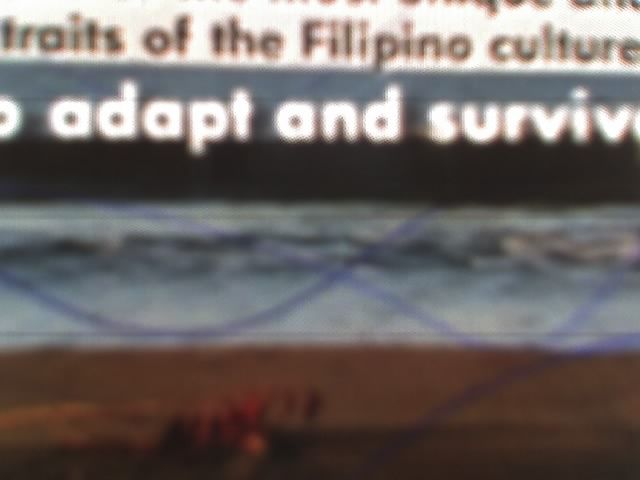
read the playbill with a mere curious eye. the one glaring trait of a new play by northwestern university graduate student gail derecho and director christopher hejl was that none of the actors sported spanish last names.
because all filipino names are spanish - that is, to some, it's ok to say that most filipino names are spanish, instead of filipino, because there's rarely a filipino name that isn't spanish. in fact, it could be said that if you sport a european-sounding name and you happen to be filipino, your ancestors could have been spanish, or noticed by the spanish. if you happen to sport a filipino name - usually with the letter "ng" or a multisyllablic form with a vowel interspaced between consonants - the spanish might not have gotten a chance to get to your ancestors' village and rename you according to spanish law.
which is a good thing.
for the multimedia play "the philippine deep" tells the story of derecho's search for personal meaning in her family's history. abigail derecho of the play narrates that she is descended from three grandfathers, one chinese, the other spanish, and a third "with no name."
she describes the third as a filipino native.
what a wonderfully apt way to drop the idea that history is written by the winners. the filipino grandfather was cuffed and tied to a chair until he is forced to sign a piece of paper saying that he pledges allegiance to the spanish crown. he signs the form and is hauled away, laughing and spitting at the jailguard. the spanish grandfather enters the room and, like the filipino, is clearly uncomfortable with signing the form. but he does.
this is where i got lost a bit in the play. i don't think it's the play's fault - i stumbled on that you had to sign a piece of paper that shows your allegiance to a certain country. as a naturalized u.s. citizen, i also had to sign certain forms - as soon as my family and i landed in LA, we were escorted to a window and introduced by an immigration officer (who looked like a security guard; he was a black man, the first-ever black man i had ever seen in my entire life, and lucky for me i remembered it was rude to openly stare at someone) to a piece of paper that we had to sign.
up until that time i had only invented my signature for my university ID two months prior, and my mind scrambled to remember what it was. as soon as i signed it, i knew i had cemented my signature for life.
i wondered if the filipino native thought of the same. or was he illiterate and could only sign it with X? but it seemed he actually wrote a first and last name.
this scene segued nicely into the idea of literacy in the philippines. the chinese grandfather's son became a lawyer to defend his father, accused of treason against the u.s. government. the judge ruled in favor of the grandfather, commending the "little brown" lawyer on his english.
language used in the play was extremely unapologetic to the point of shocking and funny - the known insults of "little brown brother," "exitable monkey," and such were crisply uttered that you know the message was simply to remember and conquer, and not to offend. sharina martin, a black woman, played a violent spanish guard that insisted the unnamed filipino grandfather sign the allegiance form. she said her being cast in the role of the guard was "not a conscious choice by the director... i don't think we should stray away from that because it was reality. it's what art does, make you uncomfortable and look at truth," she said.
the play used video and subtitles to cue audiences into eras - in the 1940s, after world war 2, the philippines had become a colony of the u.s. english became the medium of education. to adapt to a changing government, the chinese grandfather betrayed his chinese heritage and signed an oath to the u.s. government; his son learned english to defend him. to adapt to his treason, the nameless filipino grandfather laughed and spit at the spanish guard for making him sign an oath of allegiance that he detested.
to prove that the grandfather wasn't committing treason, the lawyer had him sign an oath of allegiance to the u.s. right then and there at the courtroom. this scence intrigued me because it reminded me too much of the 1970s and the supposed smooth talkers of the marcos administration. i wonder if this is just a play on the myth that all filipino males are adept at prevarication. it made me laugh.
one part of philippine history that i noticed seemed compellingly missing or intentionally omitted or grossly mistold is the country's encounter with the japanese. this play featured a scene that could probably be played by itself and still expertly relay the whole message of adaptation.
collectively, every filipino seems to hate this part of their history. i think every grandparent has either witnessed or heard about a pregnant neighbor murdered by the japanese. the story i heard is that a pregnant woman just returning from the market when the japanese came to her village. she has a very young child with her. the soldiers took her baby and played with it, tossing it in the air and enjoying hearing the baby cry and her scream for them to stop. they finally give in. they toss the child in the air, bayonet it, and then bayonet her stomach to stop her screams. they leave the bodies on the street. the father's whereabouts are curiously ommitted.
a dim spotlight shines on abigail's grandfather holding on to his mother. they are in the belly of a japanese ship, in the middle of a sea. this is an important scene in the play, where the mother remembers her spanish heritage, remembers how she asked her husband to marry her, remembers her mansion in the province, the only mansion in her small village. amid the bombs and the shell-shocked ship, she realizes that if she escapes the ship and lands on soil, the philippine guerilla will think she's loyal to the japanese, and they'll kill her. on the other hand, she and her son might die on this japanese ship anyways.
when they return to land, their entire village is burned to the ground, including their beloved mansion. an unseen neighbor calls out from the audience, every other house in their village burned to the ground almost immediately, "but your house, ma'am, your house burned for three days and three nights." the grandmother stops her seeking and melts to the ground, saying even if they rebuild there will never be another house like that for her. the scene ends with her telling her son that it's his turn now to live, to build a life.
a reiteration of the running theme: adaptation. on abigail's mother side, a widowed grandmother manages her husband's wealth wisely, and is elected the first female governor of a province of surigao. but like most government officials in a changing philippines, she yeilded to many events because her first priority is family. to gail's family, the country's prosperity was robbed by the marcoses. gail's father, a lawyer, makes every effort to leave the country. they arrive in los angeles.
at first they sleep on the floors of relatives' houses and struggle to find jobs. gail's father is happy his wife has a job, but insecure that it is better-paying than his. at 40, she returns to school to learn a new trade - from pharmacy to a skill involving computers - because someone has to support the family. the father takes private practice. gail is born and is closest to brother dennis, 13 years older than her.
gail's brother has much of their native filipino ancestor's instinct of resistance, and like their ancestor, he has good reasons for it. "you were born here. you don't know what it's like to move here at 14. they laugh at your accent, the way you dress, the way you talk," he tells gail. while gail is working toward a master's degree, dennis has faked attending police academy and was arrested for impersonating a police officer - among other offenses.
the play ends openly - dennis says he's been in the philippines all these four years that he's disappeared. he gives no indication whether he'll stay there for good, and only came back to the u.s. to bid gail good-bye. gail is clearly staying in the u.s. to pursue what it means to be filipino in america. the video ends with the real gail derecho, lead by a guide to the edge of the water of her parents' home in a province of surigao. beyond the beach is the philippine deep, a deep sea gorge reputed to be the deepest in the world.
the metaphor is challenged by friends who had attended the final performance on saturday evening, jan. 21. derecho claims that as a student production, she was obligated to offer the play first to the university and use students of the theater department. that alone is indicative of the filipino community in chicago - for which parent would send their child to northwestern to take up theater? friends and i agreed that this might be the only reason.
friends also commented that a very good contributor to the sold out 2 p.m. saturday show and the friday night show was that the play must have been a requirement for students as part of a multicultural class. but i find it indicative that, according to a friend, a whole section of audience consisted of members of a filipino student association at northwestern university.
just their attendance, no matter their motive, is enough for the filipino community. some audience raised angry questions on the message of adaptation among filipinos - saying this is why the homeland remains corrupt and unliveable, and the community here in chicago, invisible.
"i believe it's a quality that's extraordinary, and overlooked," derecho said, when approached by audience with questions at a reception after the final show on saturday. "what we do [adapt] isn't recognized as definition." she says that she wants to bring about dialogue on why there are, at best, two poles - either filipinos should be nationalistic or assimilate, "and maybe being filipino is being both," she said. she also wondered if our strategies for survival throughout history have allowed us this distinct quality of adaptation.
derecho also mentioned that history cannot be represented in types, but maybe it can be told using the experiences of individuals.
that night, i was late in attendance with a friend who wanted to go out clubbing. he was extremely, unnecessarily, angry. i chose not to retort back, because it was my fault that i couldn't tell him that tonight was a cancel. i'm not the only person we were going out with, but he's also the type to carry a grudge. i've decided, that if that sort of situation happens again, i should just cancel. i had other friends that night in the audience who wanted to talk more about the play, i should have just worked up the courage to say no.
i suppose i've gotten so greedy with engagements recently to patch up unworkable issues in the house. which i might end up discussing if this blog entry gets any longer. ahahaha. sorry. thanks for your indulgence. good night.
---
a shorter, less revealing but definitely more readable form of this piece is scheduled to appear in the february issue of the filipino-american community builder newspaper. if you are unaware of the newspaper, copies can be picked up from the UniMart on Clark Street, and the paper's offices on 5232 N. Western Ave.; telephone 773-275-4540.






